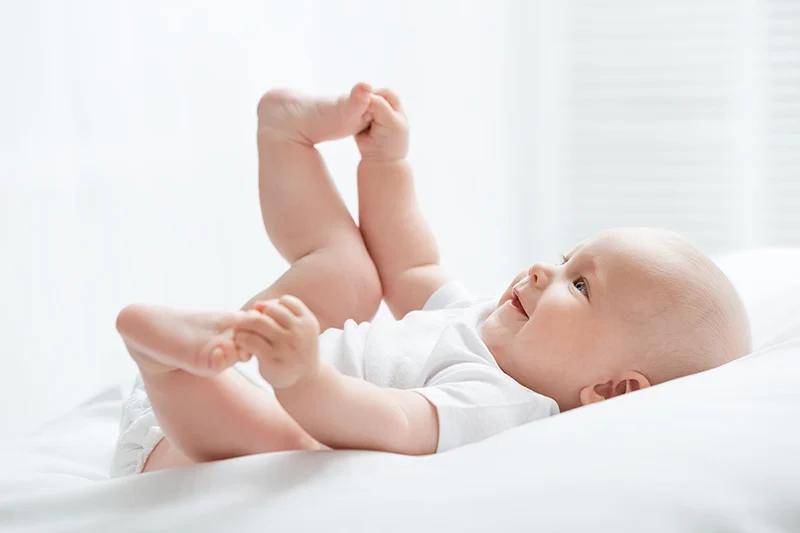Last week, while cruising down the road, my 4-year-old son piped up with an innocent question: “Are we Christmas people?” Christmas people? What does that even mean?
This holiday season, my little one has been absolutely enchanted by Christmas. At the bank, he darts toward the Christmas tree, tugging my hand along. “Look at all the ornaments! Are those presents, Mommy?” At home, it’s all about The Polar Express at bedtime. And our strolls downtown? He stops at every window to marvel at the Christmas decorations, exclaiming, “A Santa! And an elf! Wow!” I try to share in his excitement, pointing out the menorah peeking from the back of a store display. “Yup,” he says nonchalantly, “A menorah. And there’s a reindeer!”
In the car, I suppress a sigh and respond, “Yes, we are ‘Christmas people,’ but we’re also ‘Hanukkah people.’” I attempt to explain that some of our family celebrates Hanukkah and others celebrate Christmas, which makes us unique.
It’s a big discussion, and I’m pretty sure I just muddled things further. As we pull into the driveway, I feel a pang of inadequacy. December has only just begun, and I’m already exhausted. How on earth will I navigate eight nights of Hanukkah followed by Christmas? What’s the point?
The following week, I shared my car conversation with my dad. “I told little Timmy that you only celebrated Hanukkah growing up, no Christmas.”
“Well, that’s not entirely accurate,” my dad replied. “When I was a kid, I adored going to see Santa and sitting on his lap! We always looked at Christmas lights and listened to carols. Christmas was everywhere!” My jaw nearly hit the floor. I could hardly picture my father on Santa’s lap, then heading home to a Yiddish-speaking grandmother. Mind blown.
I grew up celebrating both holidays because my dad, the Jewish kid sitting on Santa’s lap, married my mom, whose mother played the organ in a Lutheran church. I imagine their marriage was quite the shock for both families. Despite their strong faith backgrounds, both my parents are pretty laid-back about religion. Each December, we celebrated Hanukkah and Christmas, focusing more on the cultural fun than the religious significance. Instead of recounting Jesus’s birth or the miraculous feats of Hanukkah, we enjoyed latkes and baked Christmas cookies. As a child, I cherished both holidays.
As I got older, my Jewish identity resonated more deeply. At seven, I asked my parents to enroll me in Hebrew school, and by thirteen, I had a bat mitzvah. I acknowledge my mixed heritage, but when people inquire about my faith, I proudly identify as Jewish.
Now, I’m raising my own blended family. My husband isn’t Jewish, so our kids are technically “one-quarter Jewish,” but I dislike quantifying identity like that. How can you measure what someone is? Like baking a cake, it’s about how all the ingredients meld together. You don’t think of a cake as just a percentage of flour and chocolate.
Of course, we celebrate Christmas! For my non-Jewish husband, it’s his favorite holiday filled with childhood memories he wants to share with our kids. I also enjoy Christmas. In line with my parents, I emphasize the cultural aspects and my Scandinavian roots. I love decorating the Christmas tree and spending quality time with family.
However, as a mom, I feel it’s my responsibility to teach my children about Jewish traditions and beliefs. If I don’t, they might miss out on understanding this part of their heritage. My baby girl is too young to grasp the holidays, but my son is ready to learn why we celebrate both Hanukkah and Christmas.
Christmas is all around us, and my son adores it—the twinkling lights, the presents with bows. Hanukkah often feels like an afterthought, with its muted blue symbols and an odd-looking menorah. Christmas dazzles with vibrant treats, while Hanukkah is known for fried potatoes. It’s like Hanukkah is the underdog in this festive showdown, and I’ve realized my son seems to view it as merely a prelude to the grand Christmas spectacle.
So, I’ve taken it upon myself to make Hanukkah thrilling for him. We’re whipping up special Hanukkah cupcakes topped with colorful sprinkles. We’re wrapping gifts in shiny paper. I’m even letting him light his own menorah, though the thought of a 4-year-old playing with fire is a tad nerve-wracking. Most importantly, I’m sharing the Hanukkah story—the tale of how a wicked king tried to erase our people, yet they rose up against the odds to defend their beliefs. I love narrating the magical elements of the story because, like Christmas, Hanukkah is full of wonder too.
Ultimately, I’ve come to understand that regardless of which holiday or holidays we celebrate, what truly matters is imparting the core values and meanings of these celebrations to our children: miracles, generosity, and the significance of family and traditions. Everything else is just icing on the cake.
For more on topics like this, check out our other blog posts here. And if you’re interested in boosting fertility, Make a Mom is a great resource. For insights on pregnancy and home insemination, listen to the Cleveland Clinic’s podcast.
Summary: This article explores the author’s journey of raising a mixed-faith family that celebrates both Christmas and Hanukkah. Through personal anecdotes and reflections, the author emphasizes the importance of teaching children about their heritage and instilling values such as generosity and family traditions, regardless of the holiday being celebrated.
